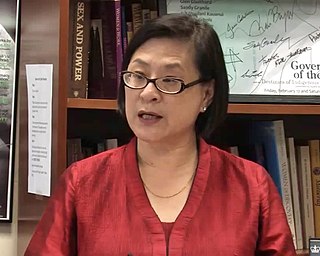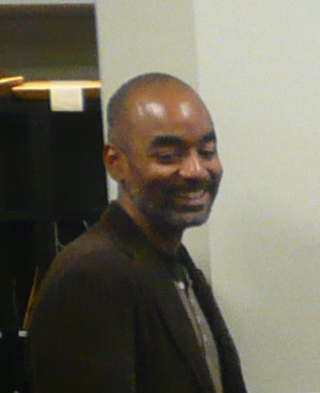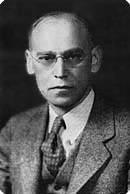
Willard Frank Libby was an American physical chemist noted for his role in the 1949 development of radiocarbon dating, a process which revolutionized archaeology and palaeontology. For his contributions to the team that developed this process, Libby was awarded the Nobel Prize in Chemistry in 1960.
Vernon Benjamin Mountcastle was an American neurophysiologist and Professor Emeritus of Neuroscience at Johns Hopkins University. He discovered and characterized the columnar organization of the cerebral cortex in the 1950s. This discovery was a turning point in investigations of the cerebral cortex, as nearly all cortical studies of sensory function after Mountcastle's 1957 paper, on the somatosensory cortex, used columnar organization as their basis.
Marjorie Hope Nicolson was an American literary scholar. She was elected a member of the American Philosophical Society in 1941 and a Fellow of the American Academy of Arts and Sciences in 1955.
William Walden Rubey was an American geologist.

Paul Hugh Emmett was an American chemist best known for his pioneering work in the field of catalysis and for his work on the Manhattan Project during World War II. He spearheaded the research to separate isotopes of uranium and to develop a corrosive uranium gas. Emmett also made significant contributions to BET Theory which explains the relationship between surface area and gas adsorption. He served on the faculty of Johns Hopkins University for 23 years throughout his scientific career.
Theodore C. Bestor was a professor of anthropology and Japanese studies at Harvard University. He was the president of the Association for Asian Studies in 2012. In 2018, he resigned as director from the Reischauer Institute following an investigation by Harvard officials that found he committed two counts of sexual misconduct.
Daniel Horace Deudney is an American political scientist and Professor of Political Science at Johns Hopkins University. His published work is mainly in the fields of international relations and political theory, with an emphasis on geopolitics and republicanism.

Richard Theodore Greener (1844–1922) was a pioneering African-American scholar, excelling in elocution, philosophy, law and classics in the Reconstruction era. He broke ground as Harvard College's first Black graduate in 1870. Within three years, he had also graduated from law school at the University of South Carolina, only to also be hired as its first Black professor, after briefly serving as associate editor for the New National Era, a newspaper owned and edited by Frederick Douglass.
Women in geology concerns the history and contributions of women to the field of geology. There has been a long history of women in the field, but they have tended to be under-represented. In the era before the eighteenth century, science and geological science had not been as formalized as they would become later. Hence early geologists tended to be informal observers and collectors, whether they were male or female. Notable examples of this period include Hildegard of Bingen who wrote works concerning stones and Barbara Uthmann who supervised her husband's mining operations after his death. Mrs. Uthmann was also a relative of Georg Agricola. In addition to these names varied aristocratic women had scientific collections of rocks or minerals.
John William Servos is an American professor and historian of science. His research centers on the historical development of science as a discourse and in the form of institutions and on how science has situated itself historically in the culture at large.

Mae Ngai is an American historian and Lung Family Professor of Asian American Studies and Professor of History at Columbia University. She focuses on nationalism, citizenship, ethnicity, immigration, and race in 20th-century United States history.

Gerald L. Curtis is an American academic, a political scientist interested in comparative politics, Japanese politics, and U.S.-Japan relations.

Robert Reid-Pharr is an American literary and cultural critic and professor.
Richard R. John, Jr. is an American historian who specializes in the history of business, technology, communications, and the state. He is a professor of history and communications at Columbia University.

For a useful starting point goto Oregon Encyclopedia of History and Culture (2022). Not yet in print format; it is online here with 2000 articles.

Dr. Robert Fox MA, DPhil, FSA FRHistS is a leading British authority on the history of science. He is interested in the history of sciences and technology in Europe from the 18th century onwards. He has published extensively. His book The Savant and the State examines science, culture and politics in France between 1814 and 1914, while Science without Frontiers examines developments from the late nineteenth-century until the Second World War. In 2015, Fox received the George Sarton Medal, the premier award of the international History of Science Society (HSS). He was recognized as a Chevalier of the Ordre des Arts et des Lettres by France's Ministry of Culture in 2006.

Herbert Wallace Schneider was a German American professor of philosophy and a religious studies scholar long associated with Columbia University.
William Winn Hay was an American geologist, marine geologist, micropaleontologist, paleoceanographer, and paleoclimatologist, primarily associated with the University of Colorado.
Russell Keith McCormmach, the husband of the late Christa Jungnickel, is an American historian of physics.
Harold Ernest Vokes, was an American malacologist and paleontologist. He specialized in bivalves, especially fossils found along the Gulf Coast and Atlantic Coast, and he taught at Johns Hopkins and Tulane universities. He often collaborated with his wife, the malacologist Emily H. Vokes.









